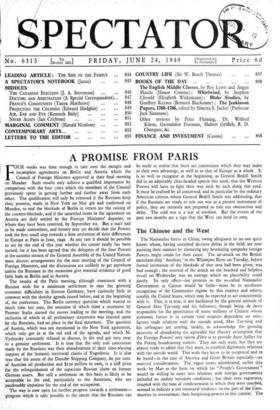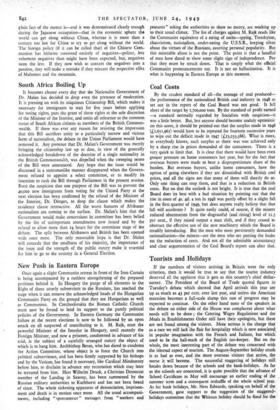The Chinese and the West
The Nationalist forces in China, owing allegiance to no one quite knows whom, having sustained decisive defeat in the field, are now assisting their enemies by alienating any hestitating sympathy foreign Powers might retain for their cause. The air-attack on the British merchant-ship ` Anchises ' in the Whampoo River on Tuesday, before formal intimation of the blockade of that area had been given, was bad enough ; the renewal of the attack on the beached and helpless vessel on Wednesday was an outrage which no plausibility could justify. Its only effect—for protests to the so-called Nationalist Government at Canton would be futile—must be to accelerate recognition of the Communist regime by this country and others, notably the United States, which may be expected to act concurrently with it. That, it is true, is not facilitated by the general attitude of General Mao Tse-tung and his followers, though being de facto responsible for the governance of many millions of Chinese whose economic future is in certain vital respects dependent on satis- factory trade relations with the outside word, Mao Tse-tung and his colleagues are coming, tardily, to acknowledge the growing necessity of abandoning the agreeable but illusory assumption that the Foreign Powers' only raison d'être is to provide Aunt Sallies for the Peking broadcasting station. They not only want, but they are almost ready to admit that they want, to establish diplomatic relations with the outside world. This wish they know to be reciprocal and to be based—in the case of America and Great Britain especially—on material considerations. The vague terms adumbrated, earlier this week, by Mao as the basis on which his " People's Government " would be willing to enter into relations with foreign governments included no unduly stringent conditions ; but their very vagueness, coupled with the tone of condescension in which they were couched, seemed to indicate a not unnatural tendency on the part of the Com- munists to overestimate their bargaining-powers in this context. The
plain fact of the matter is—and it was demonstrated clearly enough during the Japanese occupation—that in the economic sphere the world can get along without China, whereas it is more than a century too late for China to try to get along without the world. The foreign policy (if it can be called that) of the Chinese Com- munists has hitherto consisted entirely of negatives—politer, less vehement negatives than might have been expected, but, negatives none the less. If they now wish to convert the negatives into a positive, they will make a mistake if they miscast the respective roles of Mahomet and the mountain.



































